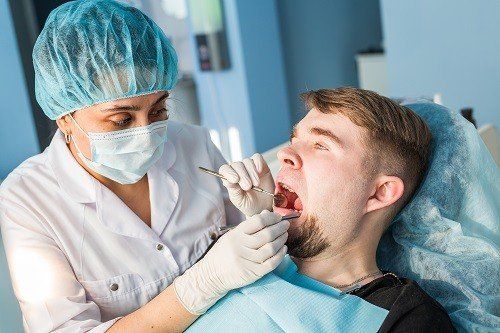Do Cavity Fillings Hurt?
Once your dental professional informs you of a cavity that’s formed on one of your teeth, and that your best course of action is getting a filling, your first question may be, "Do fillings hurt?" Concern over possible pain from cavity treatment may have you questioning whether it’s a good idea at all, but it’s important to remember that putting off treatment could make the issue far worse.
According to the National Institutes of Health, cavity treatment is often less painful as well as less expensive whenever it's done as soon as the dentist sees signs of tooth decay. If you're concerned about discomfort and pain while getting your filling, here is what you should expect both during treatment and afterward.
During Treatment
Before the treatment starts, your dentist will take measures to minimize any pain you might experience during the actual treatment, such as local anesthesia for numbing the gums and other areas of the mouth. The local anesthetic, commonly lidocaine, means just the treatment area will be numb, meaning you'll be awake for the filling and can interact with the dentist.
Once the dentist has dried the area, they’ll dab some gel onto the injection site, which numbs the gums and reduces the pain of the actual injection. You may feel a slight stinging sensation, but it’s from the anesthetic beginning to work and not the needle. From there, you shouldn’t feel any pain while your dentist works.
After Treatment
After the treatment is complete and the anesthetic begins wearing off, you may experience a slight tingling sensation in the mouth or even sensitivity in your teeth. Mostly, however, this sensitivity will likely fade within several days, and your dentist can prescribe pain relievers for any soreness you have. In such cases, it’s best for patients to avoid putting a lot of force on their treated tooth. If the sensitivity or the pain doesn't fade after a week, the filling likely needs to be examined to ensure it’s not too high.
When to Go Back to the Dentist’s Office
Fillings should improve your mouth’s comfort and health rather than make things worse. Cavity fillings shouldn't hurt beyond some soreness and tenderness for the first couple of days following treatment. If this discomfort persists past one week after treatment, you should call your dentist about coming in to possibly adjust your filling. If your soreness disappeared following your treatment, but you started experiencing discomfort or pain weeks or months later, you should check in at the dentist’s office.
Need to visit the dentist but worried about the costs of dental care? Our New Hampshire discount dental plancan help offset some of those costs. For more information about our plans or to sign up for coverage, click here.











